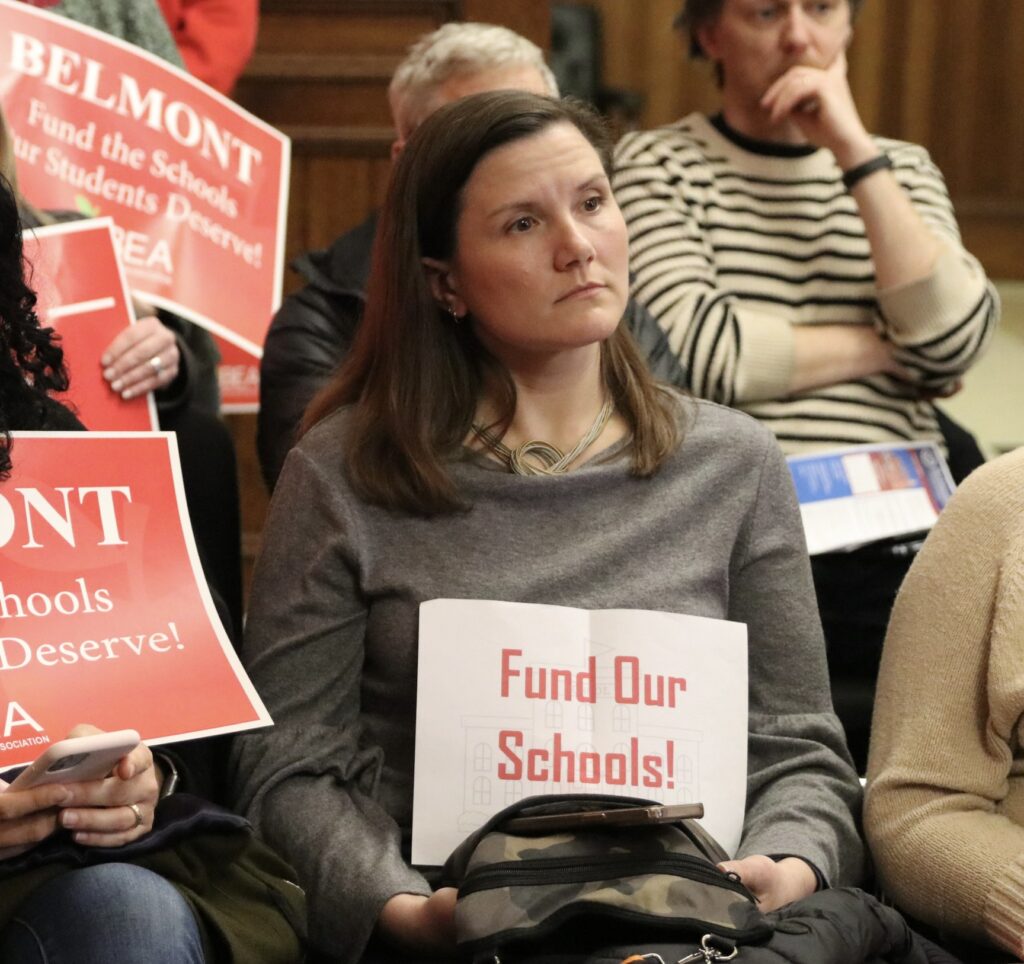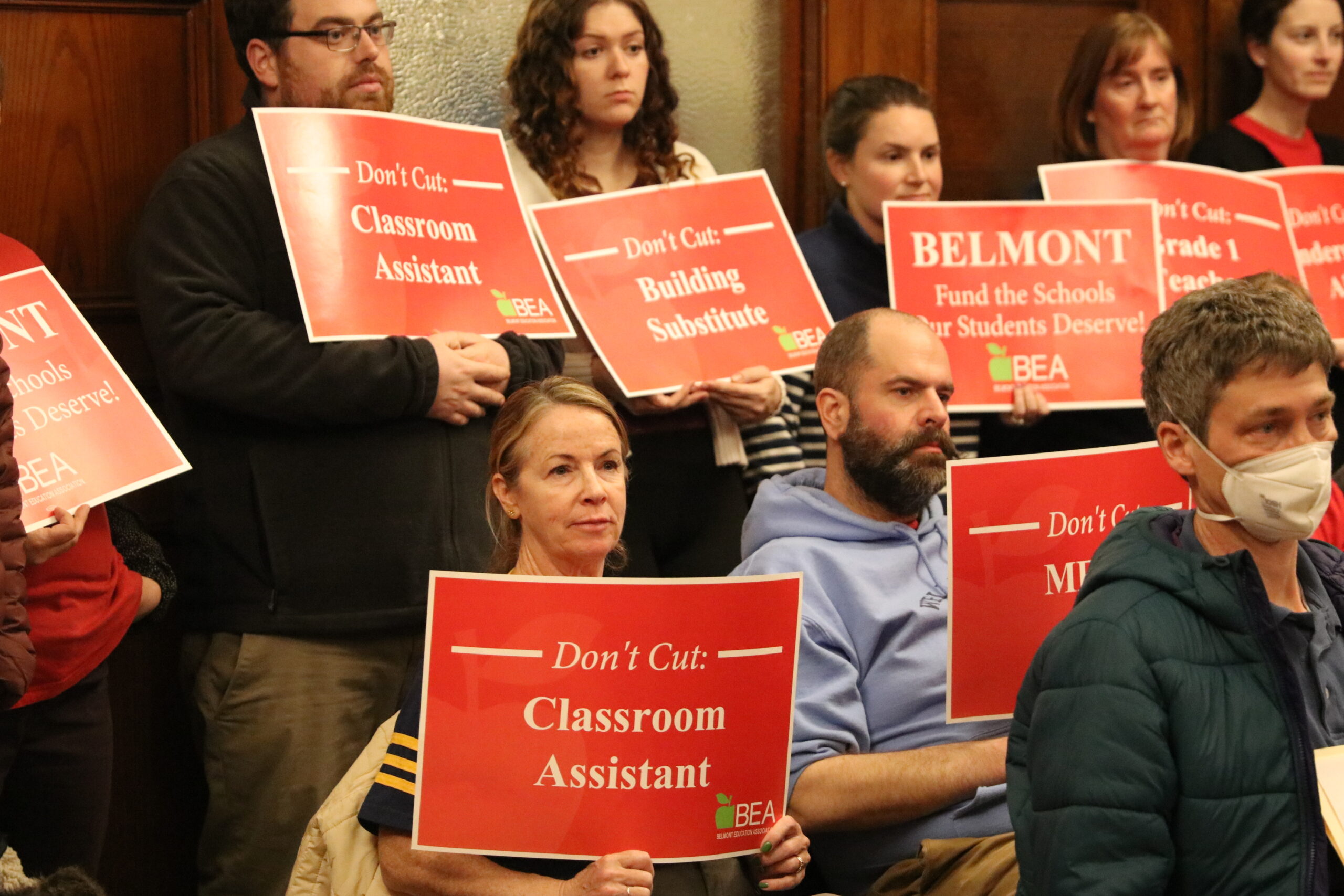Photo: Educators attend a recent Select Board/Warrant Committee joint meeting at Town Hall
On March 1, Massachusetts Gov. Maura Healey filed her state budget proposal with increases in Chapter 70 local aid, in which Belmont would receive an additional $1.4 million net for fiscal ’24, which begins July 1. And the boost in aid could not have come at a better time for the schools, the largest of the town’s departments.
Facing a $2.1 million deficit that could see nearly two dozen teachers, educators, and administrators losing their jobs and positions failing to be hired, the school district and Belmont School Committee placed their hopes that some portion of the governor’s largess would be directed to education.
But in a joint meeting held Monday night, March 20, the Belmont Select Board and the Warrant Committee (the Town Meeting’s fiscal watchdog) voted to cap the amount of free cash to use in the fiscal ’24 budget – which tops off at $138.3 million – at slightly more than $10 million. As for the added money coming from the governor’s budget, $600,000 would be allocated to the district’s depleted Special Education reserve account, with the remainder carried forward into the town’s free cash account.
At the end of the night, the schools will be asked to fill the $2.1 million deficit with the planned job cuts.
John Sullivan, head of the Belmont Education Association, who attended the meeting with two dozen teachers and administrators carrying signs calling to keep current staff, said the decision, if unaltered, will be felt in the classrooms.
“Free cash should be spent on what we need right now, and right now, we need it for staffing,” Sullivan said after the meeting. “Your kids are the ones that are ultimately impacted by these cuts.”
The town has allocated more than two-thirds of the $15 million in free cash it stockpiled over the past decade into the general budget with the schools being the chief driver, having witnessed an unprecedented 12.7 percent increase in expenses in fiscal ’24. The School District points out the record rise as a combination of two significant factors: the cost of opening the new Middle School on Concord Avenue and a historic jump in Special Education expenditures, specifically Out-of-District placement of students, that hit the budget hard.
The decision to squirrel away all future state funds is due to the realities the town is facing that it will be facing an $11 million shortfall in fiscal ’25 and $12 million in fiscal ’26. Current calculations show the town will have $5 million in the rainy day fund in fiscal ’25.

By marshaling all available state aid into free cash now, according to town officials, reduce the size of the Proposition 2 1/2 override request set to be on the ballot next April. Observers believe voters will not be amenable to a double-digit request, pointing to the rejected override this month by Newton voters that would have closed its school district’s $6 million budget gap.
“We know we need to have an override for fiscal ’25,” said Jennifer Hewitt, the town’s assistant town administrator and finance director. “But the goal is to try to make that number a winnable number” so the town isn’t stuck with “really, really bad decisions” if the override fails.
“We need to think about next year,” said Mark Paolillo, Select Board chair.
And having reserves in free cash will be critical in the worst-case scenario if voters bail on an override. The account will be used to mitigate what soon-to-be Select Board member Elizabeth Dionne described as a possible “blood bath” where the town and school district will see entire departments and services decimated with a back of the envelope calculations predicting a 10 percent cut in teaching positions.
While sympathetic to town and schools requests, Adam Dash – who will be giving up his seat on the board on April 4 – said “it’s a very dire situation, and unfortunately, it’s a bit of a zero-sum game at this point” as the town seeks a fiscally prudent solution. “The problem is that we need to bank some money and not deplete the entire savings account, what free cash is.”
But to School and Warrant Committee member Michael Crowley, the policy is a Faustian pact in which educators and programs are put on the chopping block to prepare for a future unknown. And like Oliver Twist with a bowl in hand, Crowley urged the town to find “just $500,000” to preserve posts such as teacher assistants in the elementary schools that the district has targeted for redundancy.
“Another half million in the spirit of compromise won’t destroy the bank,” said Crowley as educators in the room applauded.
But Garvin warned funds transferred from free cash to the schools would need to be offset with cuts elsewhere.
The one glimmer of hope for school advocates and educators is the likelihood that the Massachusetts House and Senate will join Healey in boosting local aid allocations in the next iteration of their budgets in the coming month. While Garvin stood firm on the town’s intention to slot any additional local aid to free cash, Select Board’s Roy Epstein was receptive to using a portion of any additional revenue from Beacon Hill towards the schools.
Steve Sloan, a Goden Street resident with a child in the district, said it’s honestly disrespectful to the parents to talk about putting all this extra money into free cash without even knowing how much you have” until the state budget is finalized.
“When you’ve got all these cuts on the table. I think that’s a bad optic and you’re sending a terrible message. At least take a compromise solution when you know how much you have.”








Leave a Review or Comment